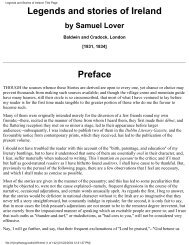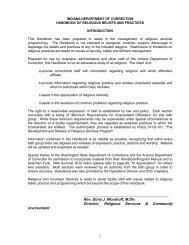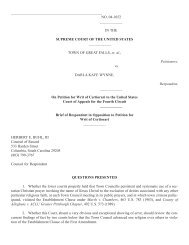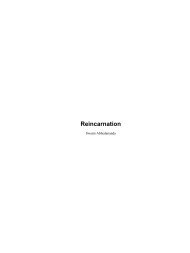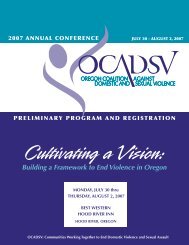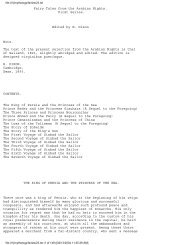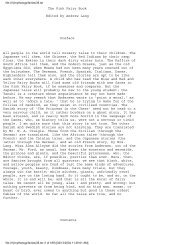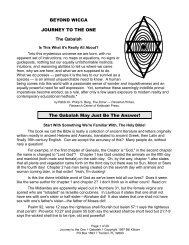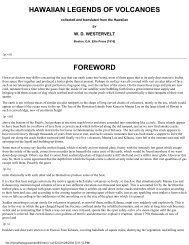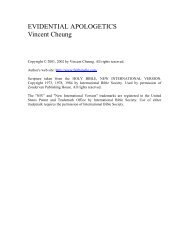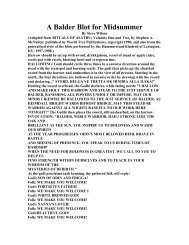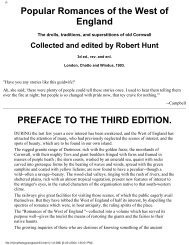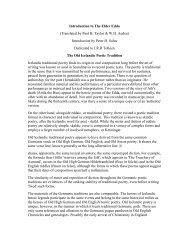Irish Druids And Old Irish Religions PREFACE CONTENTS
Irish Druids And Old Irish Religions PREFACE CONTENTS
Irish Druids And Old Irish Religions PREFACE CONTENTS
Create successful ePaper yourself
Turn your PDF publications into a flip-book with our unique Google optimized e-Paper software.
p. 3<br />
English, <strong>Irish</strong>, and Flemings go to make up the rest. We know nothing of Welsh prehistoric races.<br />
Even allowing cromlechs, circles, and pillar-stones to be called Druidical, there are fewer of these stone remains in Wales than in<br />
Scotland, Ireland, England, or France. As to other antiquities, Ireland is richer than Wales in all but Roman ruins.<br />
It is hard upon Ireland that her <strong>Druids</strong> should have been so long neglected, and the honours of mystic wisdom become the sole possession<br />
of Wales. It is true, however, that the <strong>Irish</strong> have been less eager about their ancestral glory in that aspect, and have not put forward, as the<br />
Welsh have done, a Neo-Druidism to revive the reputation of the ancient Order. But Ireland had its <strong>Druids</strong>, and traditionary lore testifies<br />
that country in the acknowledgment of those magi or philosophers.<br />
The Welsh have a great advantage over the <strong>Irish</strong> in the reputed possession of a literature termed Druidical. They assume to know who the<br />
<strong>Druids</strong> were, and what they taught, by certain writings conveying the secret information. The <strong>Irish</strong> do not even pretend to any such<br />
knowledge of their <strong>Druids</strong>. The Welsh, therefore, look down with pity upon their insular neighbours, and plume themselves on being the<br />
sole successors of a people who were under true Druidical teaching, and whose transmitted records reveal those mysteries.<br />
The revival of the ancient faith, in the organization called <strong>Druids</strong> of Pontypridd,--having members in other parts of Wales, but claiming a<br />
far larger number of adherents in America,--has given more prominence to Druidical lore. The fact of the late simple-minded but learned<br />
Archdruid, Myfyr Morganwg, a poet and a scholar, after thirty years' preaching of Christianity, publicly proclaiming the creed of his<br />
heathen forefathers, has naturally startled many<br />
p. 4<br />
thoughtful minds. The writer can affirm, from personal knowledge of Myfyr, that he was no pretender, but an absolute believer in the<br />
tenets he taught; it is not therefore surprising that students of anthropology should inquire into this revival.<br />
Such teaching is quite different from the Neo-Druidism which arose a few years ago, and whose imaginative interpretation of writings in<br />
Welsh, under the names of Taliesin, &c., were endorsed by several distinguished ministers of the Christian religion. Neo-Druidism was<br />
brought forward at Eisteddfods, and works were written to show that Welsh Druidism was simply the truth as recorded in the biblical<br />
account of the Hebrew Patriarchs.<br />
The Pontypridd Archdruid held quite another doctrine. He embraced within his fold not only Abraham, Isaac, and Jacob, but the<br />
promulgators of Hindooism, Buddhism, and all the ancient systems of so-called idolatry. He recognized his principles in them all, as they<br />
simply represented the forces of Nature, under the guise of personalities.<br />
The mantle of the octogenarian leader has fallen upon Mr. Owen Morgan, better known as Morien, long an able and voluminous writer for<br />
the Press. His version of Welsh Druidism can be studied in the recently published Light of Britannia. He assumes for his <strong>Druids</strong> the<br />
priority of learning. From the mountains of Britain proceeded the light which produced the wisdom of Egypt, Babylon, Persia, India,<br />
Phœnicia, Judea, and Greece.<br />
They who deem this too large a draft upon faith for acceptance, will assuredly discover in that unique work a mass of curious facts bearing<br />
upon ancient science, and be constrained to admit that the Light of Britannia is not the product of unreasoning Welsh enthusiasm, but is<br />
among the most candidly expressed books ever printed.<br />
It was Dr. Lanigan who asserted, "The Christian missionaries<br />
p. 5<br />
early opened schools in opposition to <strong>Druids</strong>." It was the opinion of Arthur Clive that much Druidism "blended with the Christian learning<br />
of the seventh and subsequent centuries." The same might be affirmed of Welsh Druidism. Alluding to an astronomical MS. of the<br />
fourteenth century, Clive says, "I believe that it, or rather the knowledge which it contains, is a Druidic survival, a spark transmitted<br />
through the dark ages." Gomme tells us, "that Druidism continued to exist long after it was officially dead can be proved."<br />
Dr. Moran, Bishop of Ossory, in his <strong>Irish</strong> Saints, associates the Welsh Saint David with an <strong>Irish</strong> Druid. St. David was the son of an <strong>Irish</strong><br />
Christian lady. He came to Menevia, on the Welsh promontory, made a fire on the shore, and its smoke filled the land. The Bishop then<br />
goes on to say:--<br />
"The owner of the district was an <strong>Irish</strong>man, named Baya, a pagan and a Druid. He was one of those successful rovers who years before<br />
had carved out territories for themselves on the Welsh coast, and continued to hold them by the sword. He was filled with horror when he<br />
saw the smoke that arose from St. David's fire, and cried out to those that were with him, 'The enemy that has lit that fire shall possess this<br />
territory as far as the smoke has spread.' They resolved to slay the intruders, but .their attempt was frustrated by a miracle. Seeing this,<br />
Baya made a grant of the desired site, and of the surrounding Country, to St. David, whose monastery quickly arose."<br />
Welsh patriotic zeal would receive a shock from Professor O'Curry's statement. "It appears then that it was from Erinn that the Isle of<br />
Mona (Anglesey) received its earliest Colony; and that that colony was of a Druidical people." This view has been supported by other<br />
testimony. The Welsh Cerrig Edris (Cader Idris) has been identified<br />
file:///I|/mythology/witchcraft/8/8.html (4 of 114) [02/05/2004 8:38:13 AM]



